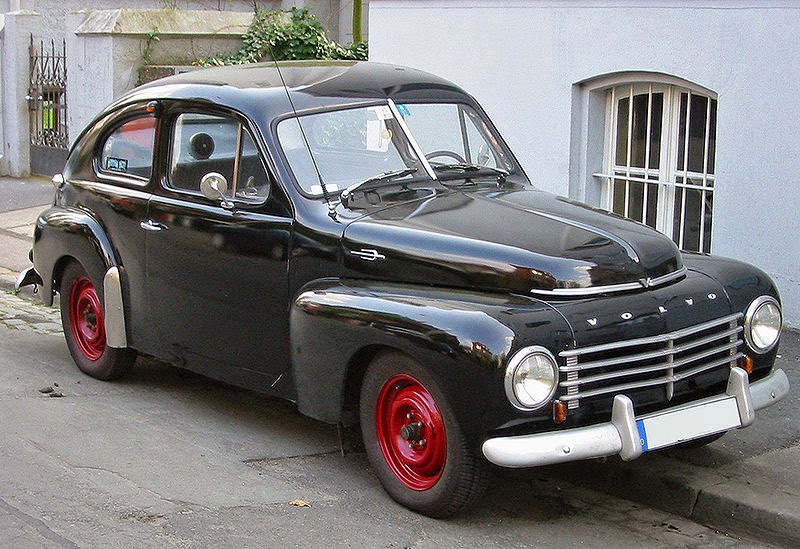Originally the subsidiary car-producing arm of Swedish ball bearing manufacturer SKF, April 14th 1927 is usually slated as Volvo's inception. The first ÖV 4 (or 'Jakob' to enthusiasts) rolled off the production line in Gothenburg on this date, and Sweden's second city still plays host to Volvo's headquarters today.
Above: A 1928 Volvo ÖV 4 'Jakob' Touring. Image: Lars-Göran Lindgren Sweden.
Within five years and one month of starting out, Volvo had sold more than 10,000 cars in 1932. The next five years also saw another 10,000 sales, however the coming wartime years all but put a stop to Volvo's car production, as the company "transformed its production to serve the armed forces".
Volvo's post-war period is where the manufacturer really came into its stride though. Not only did the PV444 and following PV544 give Volvo a convincing foot in the door of the lucrative American car market, the PV544 and Amazon led the way in road safety, being the first cars to feature three-point safety belts - which themselves were invented by Nils Bohlin.
Above: Volvo's grappling hook for the American market: the PV444. Image: Cropbot.
Volvo's safety drive didn't stop there though; in the interest of saving lives, Volvo let other manufacturers use their new three-point seatbelt technology in a move which has reputedly saved 'over one million lives'. This helped Volvo to cement its late-20th-century reputation as the go-to manufacturer for vehicle safety. Only recently has the rest of the automotive industry caught up, closing the gap between Volvo's remarkable safety standards and its key competitors.
But the latter part of the 20th century was Volvo's true golden age. The hugely successful 200 series sold nearly three million units during its marathon, 19-year production run between 1974 and 1993. As Volvo's best-selling car, it could be said that the 200 series is responsible for Volvo's rather staid image of rock-solid, safe and practical cars. But more of that later.
Above: The iconic 240, part of the world-beating 200 Series. Image: Vaa.
With a name which literally translates from Latin to 'I roll', it's clear that Volvo has gathered no moss, especially in the face of new, safer competition. Changing hands twice since the turn of the century of course took its toll on Volvo's credibility, with industry critics such as Autocar acknowledging this period as "a concerning time. But Volvo pulled through, and in the last few years has flourished under its new Chinese ownership, with models such as the XC90, gaining universal critical acclaim. This blog will later explore the highs, lows and every in-between of Volvo's across its 87-year history.
With such a rich history, it is blindingly obvious why Volvo has such a dedicated following. With their safety-first image, it's just as clear why they're still ever popular today, and with such an exciting future to boot, you can't deny that Volvo is a growing concern for the 'big three' in luxury carmaking. Volvo's Media Relations Manager, Martin Bayntun, compared Volvo's founding principles with those of today: "Assar Gabrielsson and Gustav Larson founded the Volvo Car Company in 1927 on the premise that: “Cars are driven by people. The guiding principle behind everything we make at Volvo, therefore, is and must remain, safety.” That philosophy is as true today as it was then. To that end then, our past as a manufacturer of safe vehicles continues to influence our cars today. A modern Volvo is a premium car with the very latest technology, desirable design, fuel efficient powertrains and pioneering safety equipment."
Above: The XC90, a successful exploration into new terrain for Volvo. Image: Volvo.
http://www.volvoclub.org.uk/history/milestones.shtml
http://www.volvoclub.org.uk/history/
http://www.volvoclub.org.uk/history/year_stats_search.php
http://www.volvocars.com/uk/top/about/values/pages/safety.aspx
http://www.autocar.co.uk/car-review/volvo/v40
Interview material: original content obtained via email interview with M. Bayntun




No comments:
Post a Comment